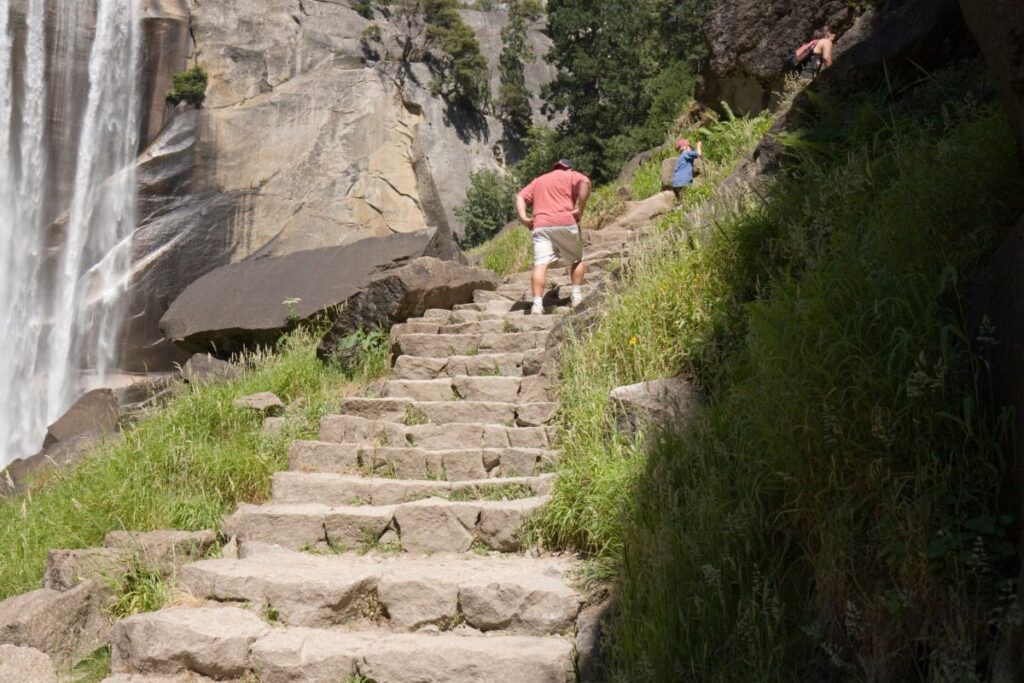When you hit the trails for a hike, whether on a gentle slope or a challenging mountain path, you’re not just treating your eyes to scenic vistas; you’re giving your heart a workout too.
Hiking is an excellent cardiovascular exercise that increases your heart rate, especially if you choose routes with some elevation. The natural uneven terrain of a trail requires your body to work harder than walking on a flat surface, engaging and strengthening your core muscles, which is vital for overall fitness.
Hiking & Cardiovascular health

Cardiovascular health is fundamental to your well-being, and regular hiking can help reduce the risk of heart diseases, stroke, and high blood pressure.
As you navigate through different hiking terrains, your lungs work efficiently, enhancing oxygen delivery to your muscles and boosting your stamina.
If you’re wondering about the diverse health benefits of hiking, know that it’s a weight-bearing exercise that can build muscle mass, fortify bone density, and help with balance and coordination.
As with any fitness routine, consistency is key. Integrating hiking into your exercise regimen can lead to long-term cardiovascular benefits, increased muscle strength, and improved mental health due to the stress-relieving qualities of being out in nature.
Picking up the pace or tackling more challenging hikes increases the intensity of the workout, allowing you to burn more calories and further improve your respiratory and circulatory system efficiency. So, lace up your hiking boots and embrace the path; your heart will thank you for it.
Find out – Why do people like hiking?
Physical Benefits of Hiking as a Cardio Workout

Hiking is more than just a refreshing outdoor activity; it’s a comprehensive cardio workout:
- that boosts your fitness level by strengthening muscles
- enhancing heart health
- managing weight
- and reducing injury risk through joint health improvement
Muscle Strengthening and Body Composition
When you hike, your lower body muscles — including your glutes, hamstrings, quadriceps, and calves — undergo a vigorous workout.
The uneven terrain challenges your balance and stability, engaging your core, and contributing to better muscle tone and body composition.
Heart Health and Endurance
The cardiovascular benefits of hiking are significant. Elevating your heart rate through this cardio workout can improve heart health by increasing endurance and reducing the risk of heart disease.
As your hike intensity increases, so does the benefit to your cardiovascular system.
Calories and Weight Management
Hiking can effectively burn calories, which contributes to weight management.
The number of calories burned is influenced by trail difficulty and personal pace – steep inclines increase the caloric expenditure, leading to more significant weight loss and management efforts.
Joint Health and Injury Prevention
The weight-bearing aspect of hiking promotes joint health and can help in preventing osteoporosis.
Regular hikes may also contribute to reducing the risk of arthritis by keeping joints flexible and muscles around the joints strong, aiding in injury prevention and overall joint resilience.
Mental and Emotional Advantages of Hiking

Exploring nature through hiking not only benefits your body but also has a profound impact on your mental and emotional well-being.
You will notice enhancements in your mood and a reduction in stress, which contribute to a healthier, more balanced mindset.
Stress Reduction and Mental Clarity
As you hike, the natural setting places you in a meditative state, clearing your mind from the clutter of daily life. The physical activity increases blood circulation to the brain, promoting mental clarity.
Studies suggest that the combination of physical exercise and outdoor settings reduces stress and helps in diminishing anxiety. Hiking can be a powerful tool to regain a calm and focused spirit in a world increasingly filled with distractions and pressures.
Mood Enhancement and Emotional Wellness
During a hike, your body releases endorphins, the ‘feel-good’ neurotransmitters, which results in a natural high, sometimes referred to as “runner’s high” in endurance athletes. This elevation in endorphin levels boosts your mood, combating feelings of depression and anxiety.
Additionally, the sense of accomplishment after conquering a trail can elevate your spirit and energy levels, further enhancing your emotional wellness. Regular hikers often report a lasting sense of peace and a more positive outlook on life.





